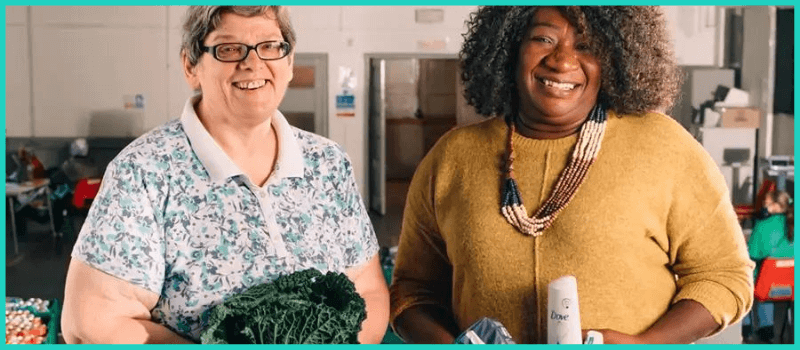Match Trading Case Study
Spring Community Hub

- Income pre and post programme: £22,787 > £184,028
- Ratio of trading income to other income pre and post programme: Zero traded income to 6% traded income
- Traded income pre and post programme: Zero to £11,882
- SSE programme: Health and Wellbeing Trade Up programme, in partnership with Guys & St Thomas’ Charity. 2019-20.
Food is a human right. Spring Community Hub exists to make sure no one in Southwark, south London goes hungry. But they don’t just provide food. They work alongside people to help them escape food poverty, build confidence, find community and employment.
As they get to know people that use the food bank, they help solve the root issues that contributed to them needing it, such as unemployment, housing, immigration and navigating the benefits system. They run skills-sharing sessions that boost self-esteem and support people back to work.
To keep bellies full and minds inspired, Spring Community Hub run holiday clubs for children, providing lunch for the whole family, endless activities and new experiences away from London.
Founder Felicia Boshorin has created a sustainable business that not only feeds 100 people each week facing poverty, but supports them into jobs, provides 8 holiday clubs for 380 children daily, and is the hub of a community that’s been in crisis.
The need for more sustainable income
When Felicia joined the Health and Wellbeing Trade Up programme in 2019, the charity wasn’t trading at all, and relied on funding, donations and the goodwill of 10 volunteers. But this wasn’t sustainable.
Felicia explains: “There’s little funding in the food bank business. You rely on donations of cash and food. However, the number of clients that came to our food bank significantly increased, especially during Covid. It wasn’t possible to continue like that. We needed other income sources to run the food bank and ensure we could continue to serve our community.”
Impact of the Match Trading grant and support programme
Increased trading income, infrastructure, staffing and volunteers
The grant gave Felicia the motivation and knowledge to explore other sources of income and start trading. She put on monthly fairs in the church hall, inviting stall holders to pay for space and started supplying meals and lunches to the children’s holiday club.
“The programme showed me that there were other ways of bringing in income – we just needed to be creative. The Match Trading grant gave us motivation.
The new sources of income through trading activity went towards the cost of running the food bank. Being on the programme gave Felicia the time and power to employ a manager to run the warehouse and logistics, as well as managing a growing team of over 100 volunteers.
Increased capacity = greater community impact
This increased capacity because of the trading income also meant that the team could cope with the increased demand during Covid-19. During the pandemic, food bank client numbers grew from 200 a month to 200 people per week. Between April 2020-Mar 2021, the team gave out over 5000 food parcels.
“I lost my job because of the pandemic and
was unemployed for over a year. I would
have never been able to support my wife and
four kids without your assistance. The help
given to me was really fundamental.” Food bank customer
Because a lot of the community are in low paid jobs and work in the hospitality sector, they lost their jobs in the pandemic. The new ‘back to work’ team supported over 80 people per month in partnership with the charity Turn2Us.
The organisation now records its social impact, has a data system, has professional logistics in place and is gaining skilled volunteers as a result. Felicia continues to diversify their income, and the focus is still on trading. They’ve recently obtained grant funding to provide a domestic violence awareness programme and have been approached by other providers already.
Strategic leadership and planning around community needs
Being on the programme meant Felicia had time to focus ‘on’ the business rather than ‘in’ the business. Project funding didn’t pay for staff, and it was the Match Trading grant and trading income that covered these costs.
Felicia says: “The grant made me more strategic, looking at the future rather than the day-to-day. It gave me the time to reflect and plan both financially and for the community’s future needs. It changed my life totally.
“The programme and grant made me a better leader. It made me identify other income sources so that we’re sustainable. We don’t need to worry about the future. It shifted our focus from a reliance on funding to a model bolstered by trading. Trading allows us to plan ahead, and it makes us more sustainable, we can keep our staff and volunteers and continue to have an impact in the community.”
Future plans
In 2022, Spring Community Hub’s income is approximately £250k with 1/3 from trading activity. Felicia aims to continue to improve the infrastructure and volunteer offer and expand income by tendering for contracts to supply holiday club meals outside of Southwark, and open two new food hubs.
Read their Impact Report here